One of the best things about science fiction and fantasy is the malleability of genre: practically anything can be combined to make a fun and credible subgenre. One of our favorites is the SFF-tinged medical thriller. After all, the only thing more frightening than a runaway virus is a runaway virus from space… or maybe a runaway virus that’s actually vampirism?
Yeah, that’s definitely scarier.
We’ve rounded up ten of our favorite examples of med/SF/F/horror, but we’re sure we missed some classics, so let us know your favorites in the comments!
I Am Legend—Richard Matheson
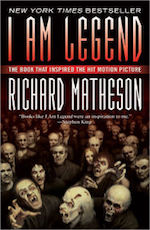 This existential horror classic revolves around Robert Neville’s fight for survival in a world that has been transformed by a pandemic. After a terrible war, people began exhibiting signs of an illness that seemed to bring the worst myths about vampires to life. Neville’s wife and daughter both die from the disease—but then Neville has to kill the vampiric version of his wife when she returns from the dead.
This existential horror classic revolves around Robert Neville’s fight for survival in a world that has been transformed by a pandemic. After a terrible war, people began exhibiting signs of an illness that seemed to bring the worst myths about vampires to life. Neville’s wife and daughter both die from the disease—but then Neville has to kill the vampiric version of his wife when she returns from the dead.
Now Neville spends his days gathering supplies and killing resting vampires, and his nights barricading himself in as the infected swarm his house. Rather than allowing loneliness and depression to kill him, he also begins researching the illness, hoping to find a cure. For a while, the book becomes a medical/vampire/mystery, before tipping back over into full horror territory.
Panacea—F. Paul Wilson
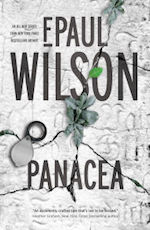 In F. Paul Wilson’s globetrotting medical thriller, two secret societies vie for control of a medical miracle called Panacea.
In F. Paul Wilson’s globetrotting medical thriller, two secret societies vie for control of a medical miracle called Panacea.
Medical examiner Laura Hanning has two charred corpses and no answers. Both bear a mysterious tattoo but exhibit no known cause of death. Their only connection to one another is a string of puzzling miracle cures. Her investigation implies that a cult has somehow gotten its hands on Panacea… but that can’t be possible. Hanning finds herself caught between groups warring over a cure she doesn’t even believe in—but she’s willing to check her skepticism when a terminally ill billionaire offers to fund her research. Now she’s in a race with the cults who want to destroy Panacea, with only her own wits and Rick Hayden, a secretive mercenary, between her and certain death. Does Panacea exist? And if it does, who will get to it first?
Earth Song trilogy—Sharon Webb
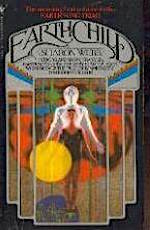 Author Sharon Webb was also a nurse, and often wrote medically-tinged sci-fi as well as medical thrillers, but this YA sequence is perhaps her best known work.
Author Sharon Webb was also a nurse, and often wrote medically-tinged sci-fi as well as medical thrillers, but this YA sequence is perhaps her best known work.
Humanity has perfected the Mouat-Gari process, which will grant immortality to anyone who hasn’t yet fully matured. But living forever comes with a catch—or, rather, a few catches. First, some of the adults are enraged that the gift of eternal life can only be given to children, which leads to years of societal upheaval. Far more important, however: it’s soon discovered that removing the specter of death has destroyed people’s will to create art. Either some people must choose mortality, or the artistic life of humanity will die just as biological immortality is gained. Should some people sacrifice eternity to provide art for the rest? And if so, how will the artists be chosen?
The Andromeda Strain—Michael Crichton
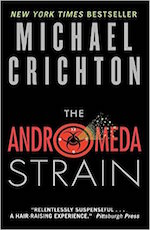 Microbes! From! SPAAAAACE! Michael Crichton’s The Andromeda Strain is a classic tale of, well, space microbes that hitch a ride on a crashing satellite, and cause ‘disseminated intravascular coagulation’—lethal blood clotting. After the highly contagious illness wipes out the population of Piedmont, Arizona, the only two survivors are taken into a secret bunker. The microbe, codenamed Andromeda, begins mutating into new forms to try to escape containment, which in turn triggers the bunker’s failsafe, an atomic bomb set to destroy all life inside. The scientists are now locked in a very literal race against time: can they capture the microbe before it escapes? And can they stop the explosion before the bunker goes up in flames?
Microbes! From! SPAAAAACE! Michael Crichton’s The Andromeda Strain is a classic tale of, well, space microbes that hitch a ride on a crashing satellite, and cause ‘disseminated intravascular coagulation’—lethal blood clotting. After the highly contagious illness wipes out the population of Piedmont, Arizona, the only two survivors are taken into a secret bunker. The microbe, codenamed Andromeda, begins mutating into new forms to try to escape containment, which in turn triggers the bunker’s failsafe, an atomic bomb set to destroy all life inside. The scientists are now locked in a very literal race against time: can they capture the microbe before it escapes? And can they stop the explosion before the bunker goes up in flames?
The Sector General series—James White
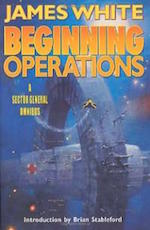 Doctors! In! SPAAAAACE! On its surface, the Sector General series is about doctors and nurses of all different alien races, working together to provide a hospital for any aliens that happen to come through. There are some really cool details—the doctors all have “educator tapes” downloaded into their minds, which, in addition to giving the doctor medical knowledge on whichever species they need, also contains the personality of the doctor who recorded the tape.
Doctors! In! SPAAAAACE! On its surface, the Sector General series is about doctors and nurses of all different alien races, working together to provide a hospital for any aliens that happen to come through. There are some really cool details—the doctors all have “educator tapes” downloaded into their minds, which, in addition to giving the doctor medical knowledge on whichever species they need, also contains the personality of the doctor who recorded the tape.
Author James White was so horrified by the sectarian violence he witnessed in Northern Ireland that he dedicated an entire science fiction series to celebrating pacifism, healing, and communication, and the result was a classic.
Dreamsnake—Vonda N. McIntyre
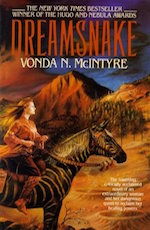 Vonda McIntyre’s Dreamsnake takes place on a post-apocalyptic Earth, where nuclear war has left much of the land irradiated and uninhabitable. A healer named Snake travels from town to town, using her snakes and the various venoms to help people. At the opening of the novel, she has three: Grass, a small dreamsnake whose venom acts as a painkiller, Sand, a rattlesnake whose venom can be used in potions, and Mist, whose venom is a stronger version of Grass’.
Vonda McIntyre’s Dreamsnake takes place on a post-apocalyptic Earth, where nuclear war has left much of the land irradiated and uninhabitable. A healer named Snake travels from town to town, using her snakes and the various venoms to help people. At the opening of the novel, she has three: Grass, a small dreamsnake whose venom acts as a painkiller, Sand, a rattlesnake whose venom can be used in potions, and Mist, whose venom is a stronger version of Grass’.
However, many of the villagers Snake visits fear her, and Grass is unfortunately killed when one group of patients panics. As dreamsnakes are extremely rare, this leaves Snake in a terrible position, and her wanderings soon turn into a quest for a new snake.
The M.D.: A Horror Story—Thomas Disch
 When Billy Michaels is 6 years old, the Roman god Mercury gives him a caduceus—a staff grants him the ability to heal people or harm them. As a child, healing people of chronic illnesses seems like the right thing to do… and so does punishing bullies and mean grandmas. But the magic and sly humor begin to curdle as he gets older, and the powers he wields become stronger. What does it mean for one person to have this kind of control over life and death? As William Michaels grows into adulthood, the power to heal interests him less—and the chance to wreak plagues upon the Earth seems far more tempting.
When Billy Michaels is 6 years old, the Roman god Mercury gives him a caduceus—a staff grants him the ability to heal people or harm them. As a child, healing people of chronic illnesses seems like the right thing to do… and so does punishing bullies and mean grandmas. But the magic and sly humor begin to curdle as he gets older, and the powers he wields become stronger. What does it mean for one person to have this kind of control over life and death? As William Michaels grows into adulthood, the power to heal interests him less—and the chance to wreak plagues upon the Earth seems far more tempting.
Children of the Night—Dan Simmons
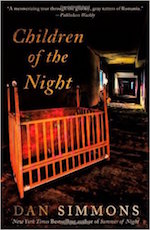 What if Romanian dictator Ceauescu was employed by strigoi—vampires—to keep a steady supply of infants for their bloodsucking needs? And what if, after Ceauescu’s fall, a vampiric baby ended up in an orphanage, and was revealed to have a nigh-miraculous type of blood that promised a cure for AIDs? This is the jumping-off point for Simmons’ thriller.
What if Romanian dictator Ceauescu was employed by strigoi—vampires—to keep a steady supply of infants for their bloodsucking needs? And what if, after Ceauescu’s fall, a vampiric baby ended up in an orphanage, and was revealed to have a nigh-miraculous type of blood that promised a cure for AIDs? This is the jumping-off point for Simmons’ thriller.
American research hematologist Kate Newman adopts the baby, bringing him back to the U.S. both to give him a home, and also to test the crap out of him and start figuring out what to do with his miracle blood. When the strigoi learn that baby Joshua has a link to their leader, Vlad Tsepes, they plot to kidnap him. But Kate and her ally Father Mike O’Rourke will stop at nothing to get him back—even if it means storming Castle Dracula itself.
The Changeling Plague—Syne Mitchell
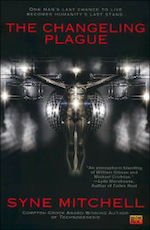 Geoffery Allan is dying of cystic fibrosis. In desperation, he spends his vast fortune searching for a cure, and finally finds a researcher willing to try an illegal treatment that will rewrite his DNA.
Geoffery Allan is dying of cystic fibrosis. In desperation, he spends his vast fortune searching for a cure, and finally finds a researcher willing to try an illegal treatment that will rewrite his DNA.
Obviously, this goes horribly wrong.
The DNA won’t stop rewriting, and then it begins spreading to everyone Allan comes in contact with. With the US government rounding up plague-stricken people, and with no hope of stopping the disease before it destroys humanity, Dr. Lillith Watkins has to team up with an unstable hacker called Idaho to try to find a way to recode human DNA.But will their attempted hack work in time?
The Time of the Fourth Horseman—Chelsea Quinn Yarbro
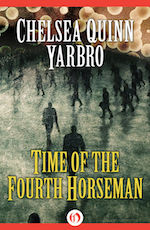 Chelsea Quinn Yarbro, best known for her Count Saint-Germain series, wrote an early novel about outbreaks and the race for a cure. The Time of the Fourth Horseman is a short novel that asks a terrifying question: how do you thin out a population swelled by lack of disease?
Chelsea Quinn Yarbro, best known for her Count Saint-Germain series, wrote an early novel about outbreaks and the race for a cure. The Time of the Fourth Horseman is a short novel that asks a terrifying question: how do you thin out a population swelled by lack of disease?
In the far-off wonderland of the 1990s, all disease has been eradicated, which has led to a population explosion. So naturally the U.S. government replaces a bunch of vaccines with placebos to thin the human race. The problem—or rather the second problem with this one, since the first is that whole “mass murder by disease” thing—is that the diseases naturally evolve into new forms, leaving doctors Dr. Natalie Lebbreau and Harry Smith to race for new cures before humanity is wiped from the face of the earth.
So those are some of the most tense thrillers we could find—tell us what we missed in the comments!










Nice list. I’d also add two of my favorites, Doomsday Book and Passage, both by Connie Willis.
“The Fireman” by Joe Hill, and, of course, “The Stand” by his pops.
The Newsflesh series by ‘Mira Grant.’ A cure for cancer and another for the common cold combine to create zombies.
You remembered James White and then forgot Murray Leinster’s Med Ship stories. Similar to Sector General is Sharon Webb’s The Adventures of Terra Tarkington, which is a fix-up of stories that mostly ran in Asimov’s. Finally, I’d suggest Frank Herbert’s The White Plague.
The Constantine Affliction is a book that has an interesting disease that changes the victim’s sex, so quite horrifying to many (especially because of the Victorian atmosphere).
Not a novel but C. M. Kornbluth’s satirical short story “The Little Black Bag” is worthy of note.
STAR SURGEON by Alan Nourse, probably the first medical SF novels many of us read.
Another “Doctors In Space” work was Alan Nourse’s STAR SURGEON (1959). I remember reading and enjoying it in grade school. Refreshing my memory with some Goodreads reviews, I realize the book’s subtext dealt with issues of prejudice and discrimination that largely zoomed past me in the early 1960’s.
L. Ron Hubbard wrote a batch of Space Doctor stories, the “Old Doc Methuselah” series, from 1947-1950. I read the DAW Books collection of the series in 1970. I remember being unimpressed.
The one I’d add would be Piers Anthony’s slightly-more-normal-than-usual (for him) Prosto Plus – the adventures of a kidnapped-by-aliens dental surgeon.
StarDoc by S.L. Viehl (first book in a series of books), and Plague Ship by Andre Norton (second in her “Solar Queen” series of novels).
The Relic, Reliquary, and Thunderhead, by Preston and Child. All of them deal with plagues and/or genetic modification, the Relic series about an ancient Aztec potion that turns people into monsters, Thunderhead about Native American mythology and primitive germ warfare.
Also the Parasitology series by Mira Grant (aka Seanan McGuire): Parasite, Symbiont, and Chimera.
Piers Anthony’s “Prostho Plus” about a space traveling Prosthodontist who travels the galaxy fixing alien teeth.
https://www.amazon.com/Prostho-Plus-Piers-Anthony/dp/0812531167
I just read a really good ebook by Jamie Davis called “Extreme Medical Services” about EMTs working with unusual patients…like a diabetic werewolf or a siren having an asthma attack.
Anyone remember Harry Harrisons “Spaceship Medic”…?
I love The Andromeda Strain. Anybody remember the part where the electronic communications experts get blindsided by a sliver of paper? It’s things like that that make Michael Crichton novels work for me.
@16 “Anybody remember the part where the electronic communications experts get blindsided by a sliver of paper?”
That’s the only part I remember, actually! So I agree with you. Crighton nailed the way “foolproof” systems tend to fail. Jurassic Park had at least two: “Our dinosaur zoo has electric fences; and the dinosaurs can’t breed because they are all the same sex. What could possibly go wrong?”
The Med Service Series by Murray Leinster is classic!
@17 Also the two (combined with the motion tracking cameras) played into each other.
at the risk of being an unnecessary wet blanket, I feel compelled to point out that it is Richard Matheson, not Robert Matheson….
@20 – Fixed, thanks!
I remember Star Surgeon fondly, but note that it’s a moderately rosy YA work. Nourse’s later SF is much bleaker; see, e.g., The Mercy Men (volunteers for medical experiments), or The Bladerunner (who gets medical care — very topical 40+ years after it came out, although the plotting is not as good as his other works).
You all missed Coma, from Robin Cook. The book is pretty chilling, and, back in those days, we hadn’t had the same plot over and over. FWIW, Michael Douglas, Genevieve Bujold, and the extremely as-yet-unknown Tom Selleck were in the 1978 movie.
Really Amazing list! I’d really recommend Dimitri H Markov’s books on medical fiction that you all must read!
They’re really fun to read and you’ll definitely love em.
Moreover,
The Changeling Plague—Syne Mitchell is an absolute thing of beauty!
Good old Sector General. Surgeon Conway enters the operating theatre to find his glass spider assistant and the elephantine pathologist discussing a scandal that had just come to light. The beings involved are spiky methane breathers so their interest could only be academic.’ But apparently their academic interest was intense’.